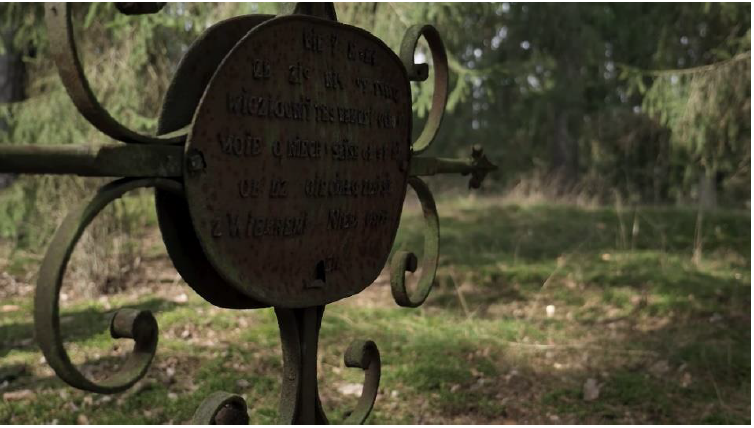„A kiedy umarte wzbudzisz dnia ostatnego,
wyciągniy też rękę do grobu moiego:
Niech usłyszę głos twoy,
obuż moie ciało,
żeby się z wiernemi do nieba dostało.“
Boże dobrotliwy
“If on that day you will raise the dead,
so also stretch out your hand to my grave,
let your voice be heard
and wake up my body
and lead me beautifully transfigured to the chosen multitude.”
O God, thou pious God
Johann Heermann 1585-1647 [1]
The ornate metal grave cross was the most conspicuous grave marker in the Klein Pasken cemetery. The still legible part of the text is from a song that was often sung at funerals.[2] Unfortunately, it is no longer recognizable who was buried in the grave.
The grave itself is poorly preserved, with a spruce root growing into it. Also the text is preserved only on one side of the cross, on the front only fragments of letters can be seen. At the beginning of 2021 the cross was removed from the cemetery for conservation.
[1] Andreas Göttmann et al.: Pasken. Geschichte eines verlorenen Dorfes in Masuren, <https://www.geschichte.hhu.de/fileadmin/redaktion/Fakultaeten/Philosophische_Fakultaet/Geschichtswissenschaften/Neu-este_Geschichte/Dateien/Pasken_-_Geschichte_eines_verlorenen_Dorfes_in_Masuren.pdf> (last access on: 09.05.2021), p. 1. – Cf. Johannisburg, Evangelisches Zentralarchiv Berlin (EZA) 506/113, Questionnaire Otto Eichel, sheet 21.
[2] Göttmann et al.: Pasken, p. 1.
